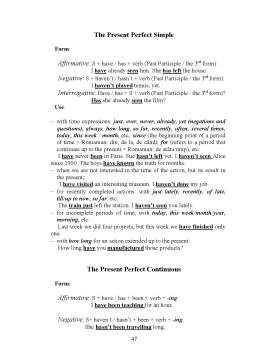Extras din curs
1. The Definite Article → the is used:
- to refer to something which has already been mentioned:
Open the door, please!
- when we talk about something or somebody considered unique:
the only one, the Earth, the Moon, etc; e.g.: The English like tea.
- with plural states and countries or representing an union:
The United Kingdom, The USA, The Netherlands.
- with proper nouns denoting groups of islands, mountain ranges, deserts, oceans, seas, rivers, channels, canals, straits:
The Black Sea, The Alps, The Thames, The Suez Canal, etc.
- with names of hotels, shops, museums, theatres, institutions:
The Hilton, The White House, The British Museum, etc
- with proper nouns denoting ships, trains, planes, newspapers and magazines: The Orient Express, The Time, The Sun, etc.
- with adjectives at superlative, nouns converted from adjectives, denoting a class, numerals: the best, the poor, the rich, the second, etc.
- with parts of the days and musical instruments: in the morning, to play the piano, etc.
- in phrases like: by the way, at one hand, in the country, for the time being, on the whole, etc.
2. The Indefinite Article → a (before consonants), an (before vowels) – uses:
- when a noun is mentioned for the first time:
I looked out of the window and I saw a big dog.
- with nouns representing a single item of a class:
A driver is a person who drives a car.
Give me a pen, please!
- with nouns denoting a profession, a job, a religion, a class:
He is a Mexican.
I am a teacher, she is an engineer.
- with little, few, so, such and what:
She has a little money. He is such a bad boy!
- in expressions of ratio (price, speed, frequency) or with numbers and expressions of quantity: five pence a box, once a day, a dozen, a hundred, a lot of workmen, etc.
- in phrases like: as a rule, as a matter of fact, at a distance, at a time, all of a sudden, in a loud/low voice, three times a week, it’s a pity, it’s a shame, to keep an eye on, have a toothache, be in a hurry, make a noise, to take an interest in, etc.
3. The O (zero) article is used:
- with abstract nouns (life, death, freedom, liberty, love, hate, knowledge, etc.), uncountable (milk, bread, butter, coffee, gold, iron, snow, cotton, wool, etc.) and plural nouns used in a general sense:
Most people fear death. Books are expensive.
- with meals, sports and games:
I have breakfast at 8 o’clock.
She sometimes plays handball.
- with proper nouns denoting persons, continents, countries, regions, towns, mountains, lakes and capes: Daniel, Europe, London, Mount Everest, etc.
- before words like: church, prison, school, hospital, market; cook, nurse, teacher, milkman, used for their primary purpose:
I go to school. Teacher is giving us a test.
- before names of languages, subjects, sciences:
I study Music. She likes Physics.
- with names of days, months, seasons, holidays:
Sunday is his favourite day.
- with the preposition by and means of transport:
I go by bike. He travels by plane.
- to express indefiniteness, instead of some:
There is some / 0 sugar in this coffee.
- in stock phrases: arm in arm, hand in hand, face to face, keep in mind, at dawn/at night, by day/by night, in place of, in order of, beyond hope, in case of, in front of, stay at home, from time to time, on sale, by means of, on foot, etc.
Exercises
1. Supply a/an, the, zero article:
(…) Computers are designed to process (…) information instead of (…) human beings.
There are (…) bugs in this program.
(…) Iron is (…) metal.
There is (…) sugar in this jar.
I can’t speak (…) French very well.
(…) Switzerland is (…) very beautiful country.
(…)English and Spanish are (…) most widely used languages in (…) world.
Tom is (…) captain of (…) British team. George Bush was elected (…) President of (…) United States.
(…) computer is (…) powerful tool.
A (…) computer expert can solve such (…) problem.
(…) engineer in Computers is very expensive.
(…) fax gives to (…) person (…) opportunity to work at home.
(…) scanner can grab (…) picture very fast.
I’m going to buy (…) new computer (…) next month.
(…) Last night, I found (…) virus in (…) program.
Sam studies at (…) University. He attends (…) evening classes.
Mary is at (…) hospital. He works as (…) nurse.
She goes to (…) work by (…) bus every day.
He goes to (…) school on (…) foot.
We had (…) tea at 4 o’clock.
(…) breakdown happened at (…) midnight / in (…) morning.
I waited at (…) church for (…) hour.
Preview document
Conținut arhivă zip
- Engleza.doc





























































































































